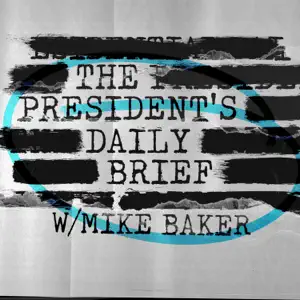
Time to end secret data laboratories—starting with the CDC
The American people are waking up to the fact that too many public health leaders have not always been straight with them. Despite housing treasure…
Thought Leader: Marty Makary

Three outcomes are possible in Donald Trump’s war with Harvard: Scenario one is that the nation’s top private universities remain delusional about the dozen reasons a large and growing share of the public distrusts them. The “plan” is to avoid institutional course-correction and seek protection from the courts and ultimate rescue from the Democratic Party in 2029 or after.
Scenario two is that Mr. Trump and other populist-inspired politicians force change from without by intervening more consistently and even more forcefully in the internal operations of these schools.
Scenario three is that substantive reform comes from within these schools, or at least some of them. That would require their leaders to listen humbly to a broad range of legitimate criticisms—about the cowering before vandals and antisemites, about endless celebration of regressive identity politics, about administrative bloat and indefensible tuition hikes, and about the corruption of teaching and research—the nearly 4.0 average grades across the humanities, tenure rates of 80% and 90%, and a replication crisis in many fields. After deliberation and introspection, boards and presidents would need to announce publicly a reform agenda with precise goals and a specific timetable.
Many Americans have a rooting interest in the conflict between Harvard and Mr. Trump. I’ll put my cards on the table and acknowledge my ideal that reform come from within for these important institutions. (I have a bachelor’s degree from Harvard and a daughter who commissioned out of Harvard ROTC into the Air Force.) But I also understand why one might think it naive to expect anything of the sort, given that top universities have for decades arrogantly resisted any critique of their drift into shallow partisanship, especially in the humanities and social sciences.
Public distrust is not only increasing but accelerating—Gallup tracks a collapse from nearly 60% of the public judging higher education a valuable sector a decade ago to barely a third today, including a precipitous fall among Democrats as well as Republicans. It’s bizarre that self-styled champions of higher education would wish for a listless no-reform scenario and thereby the increasing political ghettoization of elite universities. And if scenario two isn’t already inevitable, the pursuit of scenario one heightens its probability in the long term, as the pendulum of partisan elections sooner or later swings back to the Republicans.
Every constructive path forward therefore requires the Ivy League and Ivy-adjacent schools to acknowledge they’ve screwed up. Although their crests once represented the most distinguished education in the world, years of misguided administration have left them academically adrift. Top-tier universities act entitled to elite status, even as they neglect the necessary work of persuading fellow citizens of their value and seriousness. Standards are slipping and political activism has been on the rise in classrooms, all in the public eye. When those entrusted with massive endowments fail to acknowledge valid criticism and correct course, is it any wonder they trigger a backlash?
In response, a thirsty White House has begun launching a broad range of weapons at the richest and best known of these universities. Harvard is under investigation for tolerating antisemitism in violation of the 1964 Civil Rights Act. It has seen $2.6 billion of National Science Foundation, National Institutes of Health and other federal grants canceled. It has learned its students’ Perkins grants, Stafford loans and Pell grants could be at risk. Federal contracts have been frozen. The ability to admit foreign students, who constitute 27% of Harvard’s student population and a larger share of tuition revenue, has been withdrawn, though a court has enjoined that move. Mr. Trump has said he wants to revoke the university’s tax-exempt status, and congressional Republicans seek to raise the tax on income from the largest endowments—with Harvard’s $53 billion sitting atop the leaderboard.
These punishments fall along a continuum of tightly connected to tangentially connected to unrelated to the school’s alleged misdeeds. But the most invested observers seem either strongly against Harvard or strongly against Mr. Trump, and thus relatively uninterested in proportionality or due process.
The administration speaks of Harvard as an undifferentiated monolith. In reality, large universities are like cities filled with different neighborhoods, projects and ventures rather than a single-purpose organization with one set of books reporting through a definable structure to an identifiable boss. A college president is more like a mayor than a company CEO.
The American university—with roots in both the German scientific tradition and the English residential college—is esteemed around the world partly because of its awkward combination of advanced research and undergraduate teaching in one complex organization. When it works, it sparks extraordinary and unpredictable dynamism, as in Silicon Valley over the past-half century. When it doesn’t, the lack of accountability infuriates the citizens who pick up a large subsidy tab to feed pap and poison to the students we’re told are our nation’s future leaders.
The public’s biggest gripes about top universities center on the politicization of the humanities and the lack of accountability in the teaching enterprise amid skyrocketing expenditures, whereas the easiest governmental leverage to deploy against a place like Harvard is turning off the federal research funding spigot. But what does the cutting-edge biomedical researcher or computer scientist have to do with woke orientation staff foisting racial division into every corner of freshman arrival week? Not much. And political threats to revoke Harvard’s tax-exempt status are constitutionally egregious. As Chief Justice John Marshall famously observed in McCulloch v. Maryland (1819), “the power to tax involves the power to destroy.”
Nonetheless, Harvard isn’t owed in perpetuity the discretionary billions of federal funding it has received in the past. There’s a massive gulf between finding new cancer treatments and funding campus wackiness, between developing digital technologies to enable synthetic biology and subsidizing activist professors’ Hamas advocacy. Funding basic science through competing universities arguably has the highest return on investment of any work the federal government does. But the public has reason to doubt that boards and presidents have the backbone to ensure the dollars they steward actually support real science over culture-warring that masquerades as expertise.
And so the administration sees an opportunity—and among its more serious members, an obligation—to force reform from outside. Even though personal vendettas and popular rage can only destroy, fans of the vigorous approach see it as creative destruction: If Harvard won’t reform, at least publicly punishing it might indirectly yield reform at Dartmouth.
WWSG exclusive thought leader Ben Sasse brings a unique perspective as former U.S. Senator, university president, and New York Times bestselling author. His compelling analysis examines how digital disruption is reshaping American institutions, offering audiences both historical wisdom and forward-looking strategies for navigating our changing landscape. From defending free speech to building resilient communities, Sasse provides leaders with the intellectual framework needed to address today’s complex challenges. To invite Ben Sasse to your next event, contact WWSG.
Time to end secret data laboratories—starting with the CDC
The American people are waking up to the fact that too many public health leaders have not always been straight with them. Despite housing treasure…
Thought Leader: Marty Makary
David Frum: How Harris Roped a Dope
This piece is by WWSG exclusive thought leader, David Frum. Vice President Kamala Harris walked onto the ABC News debate stage with a mission: trigger…
Thought Leader: David Frum
Michael Baker: Ukraine’s Faltering Front, Polish Sabotage Foiled, & Trump vs. Kamala
In this episode of The President’s Daily Brief with Mike Baker: We examine Russia’s ongoing push in eastern Ukraine. While Ukrainian forces continue their offensive…
Thought Leader: Mike Baker

